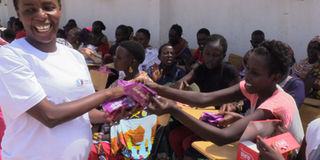Premium
Archers Post, where men use polythene bags as condoms

Good Life Trust Executive Officer Faith Ndiwa distributes both male and female condoms to women in Archers Post, Samburu County during World Aids Day on December 1, 2018. PHOTO | VIVIAN JEBET | NATION MEDIA GROUP
What you need to know:
The small town is located in Samburu County and is on the Sh13 billion Isiolo-Moyale highway.
It is known for its tasty nyama choma joints and has experienced rapid growth since it is a transit point to Marsabit County and Moyale town on the Kenya-Ethiopia border.
- Locals claim that the supply of male condoms has been so low that some have taken to recycling the rare commodity while others use polythene papers to protect themselves during sexual intercourse.
Residents living in Archers Post, a small town that sits next to Ewaso Ng’iro River that splits Isiolo and Samburu counties, are keen on having protected sex despite biting condom shortage.
The small town is located in Samburu County and is on the Sh13 billion Isiolo-Moyale highway. The town is known for its tasty nyama choma joints and has experienced rapid growth since it is a transit point to Marsabit County and Moyale town on the Kenya-Ethiopia border.
The training of military personnel for both local forces and British soldiers has also contributed to the town’s growth.
Archers Post is also a destination for both local and international tourists because of its proximity to national reserves both in Isiolo and Samburu counties.
The town’s growth has come with its share of shortcomings since it has seen a number of young women flock the area to engage in prostitution.
CONDOM SHORTAGE
A section of the area residents claimed that the supply of male condoms has been so low that some locals have taken to recycling the rare commodity while others use polythene papers to protect themselves during sexual intercourse.
Years after the introduction of female condoms into the Kenyan market more than a decade ago, much of the adult population in the area is still grappling to understand how to use it unlike the common male condom.
As the residents they joined millions of Kenyans in marking the World Aids Day on Saturday, participants who graced the event pledged to engage in safe sex in bid to reduce the HIV/Aids transmission rates, sexually transmitted diseases (STDs) and unwanted pregnancies in spite of biting male condom shortage.
WASH CONDOMS
According to Mr Julius Lelesit, the area has been hit by rising HIV/Aids cases following influx of people on transit who spend their nights in local lodges, grinding poverty which has pushed girls into prostitution and presence of soldiers who befriend local women while on training duty far away from their families or partners.
Easy cash from sand harvesting, he said, has also contributed to the spread of HIV/Aids.
“The spread of HIV and Aids has been worsened by a section of locals who normally wash used male condoms due to its scarcity especially after the government banned use of polythene carrier bags last year,” said Mr Lelesit.
A few free condoms that cannot even sustain the demand are being sold by individuals who muster the courage to collect them from dispensers in health facilities.
Apart from the ignorance on use of female condoms that would probably save lives during such scenarios, many of the residents have not come across the product.
Some men are sceptical, questioning whether their wives would ever get children after using female condoms.
In 1994, World Health Organization introduced female condoms in order to involve women equally in their approach to control and prevent spread of HIV/Aids.
SHOCKING REVELATION
During the launch of mass condom distribution as part of the celebration to mark World Aids day, Good Life Trust Executive Officer Faith Ndiwa preferred to commemorate the event with area residents in bid to educate them on how to protect themselves from contracting sexually transmitted diseases.
Stigmatisation of those living with HIV/Aids is rife in the area as locals consider them ‘cursed. Some infects persons are said to have been abandoned by their families while others fear going for medication in health facilities.

Women in Archers Post, Samburu County excited after receiving female condoms for the first time. Good Life Trust Executive officer Faith Ndiwa distributed both male and female condoms to women in the area during World Aids Day on December 1, 2018. PHOTO | VIVIAN JEBET | NATION MEDIA GROUP
Dr Ndiwa planned the event in the town after learning that some locals wash condoms for reuse while others use polythene bags during sex.
This shocking revelation was made during a routine climate change and health event in the region.
“At first, it sounded as a joke but after finding out the truth, I decided to intervene,” said Dr Ndiwa.
Her office, she said, contacted National Aids and STI Control Programme (NASCOP) which provided the condoms.
The organisation, she said, will liaise with the Ministry of Health to train locals in Samburu County on reproductive health and use of female condom since communities are said to shy from talking about the subject.
Women who benefited from the few female condoms were taught on how to use them.





